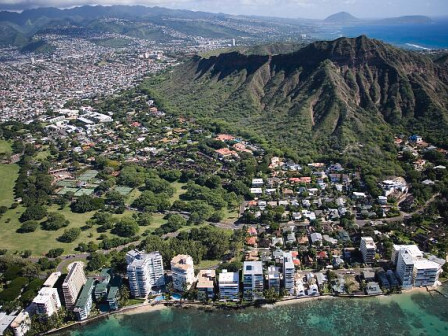
Archived Content
This site contains information that has been considered archived and will no longer be updated.
EDA and Feed the Hunger Help Stabilize Market Access for Hawaii’s Small Farmers
The coronavirus pandemic hit Hawaii’s tourist economy like the surf at Pe’ahi; almost overnight, visitor arrivals plummeted more than 99 percent.1 But the impact of the disaster was felt far beyond the normally crowded beaches and mega-resorts of Waikiki and Wailea. The requisitioning of Aloha Stadium’s parking lots to store unused rental cars partially displaced a popular community market. Combined with heightened public health restrictions, the reallocation of the stadium’s parking forced the suspension of the 40-year-old Aloha Stadium Swap Meet, depriving small farmers on Oahu of one of their major retail outlets.
That’s when Feed the Hunger Fund stepped in. The San Francisco-based non-profit has been active in Hawaii for more than a decade, administering a food-focused loan program that works to provide capital access to communities excluded from traditional financing options like bank loans and venture capital. Prior to the pandemic, its Economic Development Administration (EDA) capitalized Revolving Loan Fund (RLF) seeded millions of dollars to small businesses involved in maintaining healthy local food ecosystems in the islands.
Thanks to the CARES Act, Feed the Hunger Fund secured an additional $649,000 from EDA to support Hawaii’s small farmers. Among the loans issued with these funds is Farm Link Hawai’i, whose home grocery delivery service sources products from more than 200 local growers. Farm Link Hawai’i’s loan allows it to scale-up operations by purchasing more delivery vehicles. This, in turn, is helping Hawaii’s small and low-income farmers get their product to consumers despite the challenge of changing and disrupted supply chains.
Feed the Hunger has not limited the distribution of its RLF to Oahu. When the disruption of shipping lines pushed outer islands like Molokai towards a food crisis, Feed the Hunger was there. The organization is providing RLF financing to the Friendly Isle’s only slaughterhouse, supporting improvements designed to increase its processing capacity.
According to Feed the Hunger CEO Patti Chang, EDA is instrumental in allowing the organization to establish and maintain a presence in Hawaii during the public health emergency and beyond.
“EDA was the first funding source that allowed us to do business in the islands,” explains Chang. “It was this initial source of money that allowed us to start and, from that point, grow and expand.”
EDA makes Economic Adjustment Assistance grant awards to establish RLFs that make loans to businesses that cannot otherwise obtain traditional bank financing. To see how other funders and borrowers are utilizing EDA’s RLF program, please visit EDA’s Small Business/RLF Success Stories webpage.
1. Hawaii Visitor Statistics Released for April 2020. Hawaii Tourism Authority. (2020, May 28). https://www.hawaiitourismauthority.org/news/news-releases/2020/hawaii-visitor-statistics-released-for-april-2020
